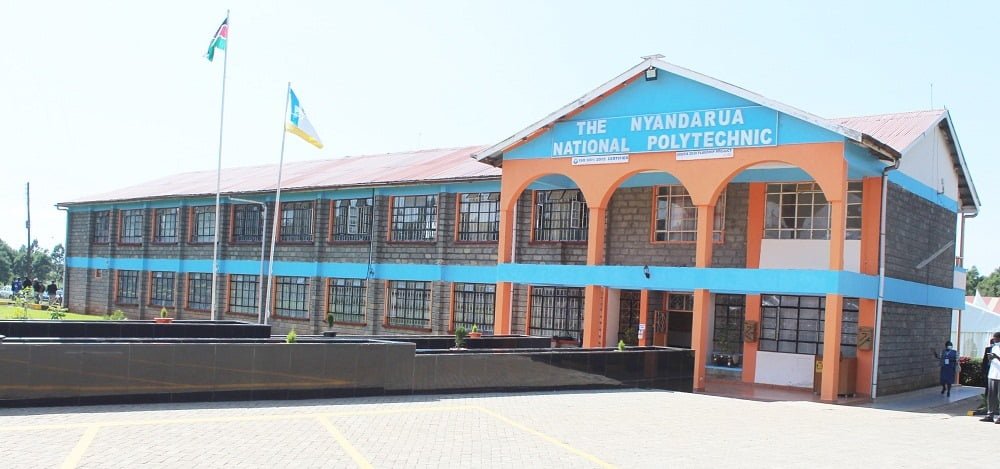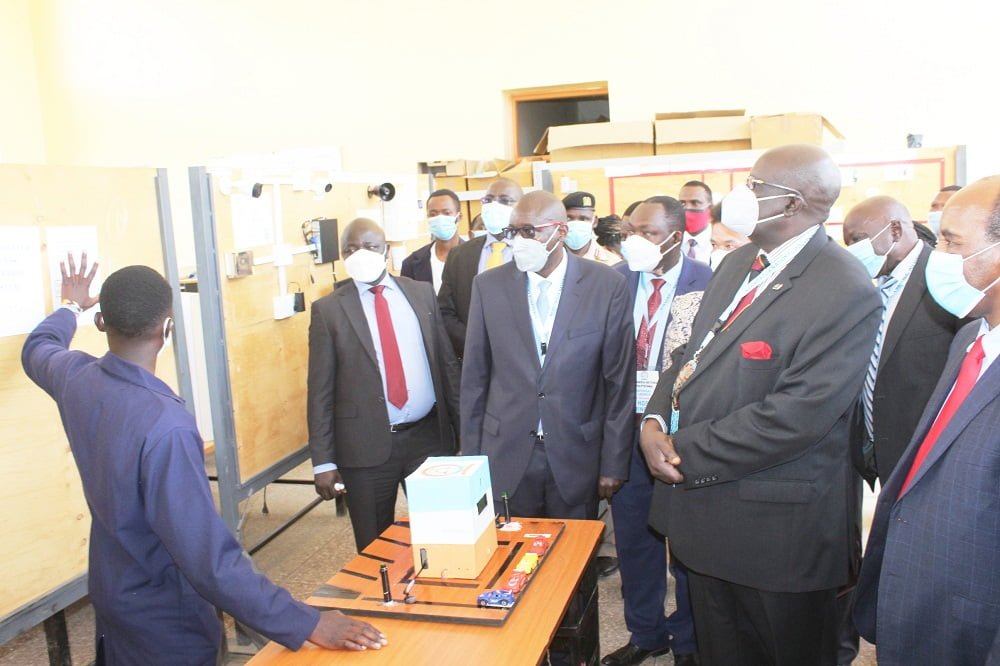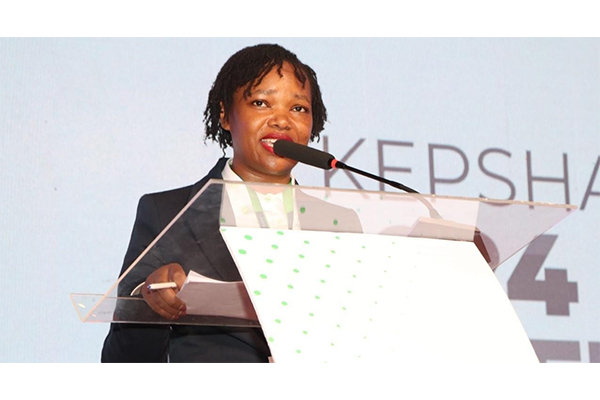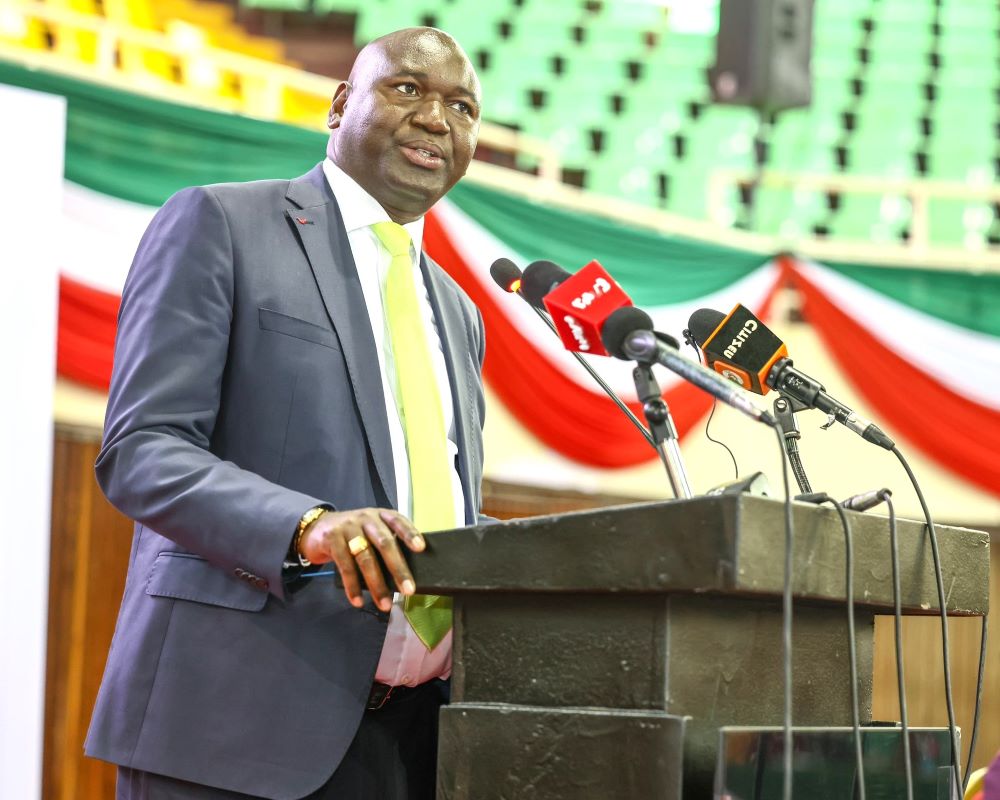By Asa Maina
When he last visited Nyandarua National Polytechnic, Cabinet Secretary for Education Prof. George Magoha said it was an eyesore which lagged behind in many aspects.
A year later, during the official launch of the newly elevated Polytechnic and the unveiling of its 2021-2026 strategic plan the CS termed the institution’s transformation as commendable.
“I am satisfied that the little money the institution received was properly used. We are going to give you more money because we have seen the work that has been done here with the little you had, we can see how it was used and we can attest that it didn’t go in your pockets,” he said.
He admitted that the transformation from the gate to the whole compound, the farm and the rest of the infrastructure was commendable and pledged to fund completion of the Sh 90 million workshops complex project.
Magoha also supported calls by area leaders to have the facility offer degree progammes in the future, but advised that the institution should step up its efforts in order to realize that desire.

The CS assured that the government will post more trainers at the institution, to help impart knowledge to trainees and called on the polytechnic administration to focus on being a centre of excellence in a selected field.
He said Nyandarua being a potato-producing area, researchers from the institution should take the lead in the research and production of potato seeds.
“That is why I am coming back here in February. I want to see whether all the land you have is being used for the production of potato seeds of different varieties,” Magoha said.
The PS for Vocational and Technical Training, Dr. Margaret Mwakima attributed the success to hard work, resilience and commitment towards excellence.
She said its elevation from Nyandarua Institute of Science and Technology to Nyandarua National Polytechnic places it in a unique position to effectively contribute to the labour market through training of all-rounded skilled individuals with the right mix of skills that match the best in the world and with the right attitudes towards work.
“Mine is to challenge the governing council to become more innovative in terms of income-generating activities to enhance the financial sustainability base of the institution,” she added.
The ministry, she said, is committed to supporting the Polytechnic in infrastructure base, funding where possible.
Chief Principal Dr. Felix Mung’atu said since its elevation, there has been an outstanding shift in focus, an indication it is ready to deal with the challenges of its new status.
“We have also witnessed a sharp increase of students’ population from 1,200 to 2,500 which is a 100 percent increase and at such momentum the population is expected to grow to over 10,000 students in five years.” he said
The institution has taken steps in the implementation of the CBET curriculum by retraining all its trainers in collaboration with TVET Curriculum Development Assessment and Certificate Council (CDACC) on the implementation of the CBET curriculum.
“In the field of research, we have entered into a partnership with the Kenya Industrial Property Institute (KIPI) on the patenting of innovations by staff and trainees and we are also in the process of establishing a Technology Innovation Support Centre (TICS) which will serve the polytechnic and the entire Nyandarua community” he added.
The research development and innovation department have also spearheaded awards winning in innovations among staff and trainees which include the weeding machine and the chain-link making machine which won the best awards in the mechanical engineering category in the TVET fair.
Others are the semi-automatic mat-making machine which was outstanding during the Rift Valley Technical Institutes TVET fair this year.
The polytechnic has developed patenting in collaboration with KIPI to guide the incubation and eventual commercialization of the innovations for the mutual benefit of the institution and innovators.
On the realization of the Big Four Agenda, the polytechnic has increased the land under cultivation to 20 acres and dairy cattle increased from four to ten to meet the internal milk demand and sell the surplus in a bid to contribute towards food security.
“As we take our position as the eleventh national polytechnic in the country, we acknowledge the importance of collaborations and partnerships with stakeholders including industries and academia,” he added.
This, he said, will enable the polytechnic to produce market-driven and relevant courses so that the graduates can take their place in the country’s transformation.
Consequently, it has signed MOUs with various national and international partners including the Institute of Canada under the project called Supporting Innovation in Technical, Vocational and Education which is involved in value addition to potatoes with a target of coming up with fortified potato flour.
The polytechnic is also partnering with the Ministry of Education in another project dubbed Young Africa Works, Kenya TVET, helping in the establishment of centers of excellence in the Agriculture related CBET programmes.
This programme will help improve the employability of TVET graduates in the agriculture sector.
“We are in the process of signing an MOU with the Kenya Agricultural and Livestock Research Organization (KALRO) in potato seeds multiplication and National Industrial Training Authority (NITA) and KSD for accreditation as training centers,” he says.
However, the polytechnic faces challenges of funds to build training rooms, hostels developing infrastructure to cater for the increasing population.
It requires heavy investment in both infrastructural and human resource capacities which continues to stretch the scarce financial resources at its disposal.
Mr. Mung’atu appreciated efforts by the government to fund trainees through capitation and provision of loans through HELB and bursaries as well as the provision of training equipment and machinery.
“We remain committed to quality training and declare our resolve to continue addressing the opportunities and challenges that come our way, more so in playing our role in the realization of the Big Four Agenda.” He said
The governing Council chairperson, Prof. Evelyn Wagaiyu said the strategic plan launched will provide the polytechnic with a roadmap in carrying out her new mandate and manage the anticipated fast growth in students’ population, infrastructure, training programmes and labour force.
The students’ population growth has exerted pressure on existing resources and facilities, he said while appealing for support from the ministry for the projects in the strategic plan citing challenges of classrooms, laboratories, workshops, student hostels and shortage of trainers among others.
The council has employed over 70 trainers leading to further financial constraints.
The institution also urgently requires a pedestrian walkway from Kwa Mugo area to the polytechnic.
“We also need deceleration and acceleration lanes on both sides of the road, bumps, possibly a pedestrian overpass crossing, a bus stop and streetlights for security purposes,” she added.
Nyandarua Governor Francis Kimemia pledged to handle the acceleration and deceleration lanes, street lighting, and enhancement of water supply and to help the institution get a title deed.
He thanked President Uhuru Kenyatta and the CS for honouring their request to elevate the institution and proposed the need to allocate the institution more land for expansion.
Ol Jororok MP Michael Muchira said NG-CDF will do a police post within the institution to improve security and work with the county government and the Energy ministry to do street lighting.
Majority Leader Amos Kimunya called on private investors to invest in hostels and accommodation for staff and trainees to complement the government’s effort.
The idea of starting the institution was muted in the 1980s when residents contributed their resources and the construction started in 1996.
The institute admitted its first batch of students in September 2006 and was elevated to its current status in December 2020.
In 2003 and 2004, area MPs came together to complete the project through the NG-CDF kitty.






